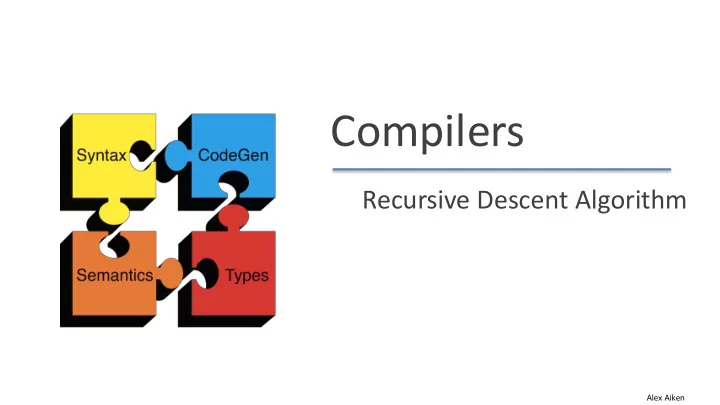

Compilers Recursive Descent Algorithm Alex Aiken
RD Algorithm • Let TOKEN be the type of tokens – Special tokens INT, OPEN, CLOSE, PLUS, TIMES • Let the global next point to the next input token Alex Aiken
RD Algorithm • Define boolean functions that check for a match of: – A given token terminal bool term(TOKEN tok) { return *next++ == tok; } – The nth production of S: bool S n () { … } – Try all productions of S: bool S() { … } Alex Aiken
RD Algorithm • For production E T bool E 1 () { return T(); } • For production E T + E bool E 2 () { return T() && term(PLUS) && E(); } • For all productions of E (with backtracking) bool E() { TOKEN *save = next; return (next = save, E 1 ()) || (next = save, E 2 ()); } Alex Aiken
RD Algorithm • Functions for non-terminal T bool T 1 () { return term(INT); } bool T 2 () { return term(INT) && term(TIMES) && T(); } bool T 3 () { return term(OPEN) && E() && term(CLOSE); } bool T() { TOKEN *save = next; return (next = save, T 1 ()) || (next = save, T 2 ()) || (next = save, T 3 ()); } Alex Aiken
RD Algorithm • To start the parser – Initialize next to point to first token – Invoke E() • Easy to implement by hand Alex Aiken
RD Algorithm E T |T + E ( int ) T int | int * T | ( E ) bool term(TOKEN tok) { return *next++ == tok; } bool E 1 () { return T(); } bool E 2 () { return T() && term(PLUS) && E(); } bool E() {TOKEN *save = next; return (next = save, E 1 ()) || (next = save, E 2 ()); } bool T 1 () { return term(INT); } bool T 2 () { return term(INT) && term(TIMES) && T(); } bool T 3 () { return term(OPEN) && E() && term(CLOSE); } bool T() { TOKEN *save = next; return (next = save, T 1 ()) || (next = save, T 2 ()) || (next = save, T 3 ()); } Alex Aiken
RD Algorithm Which lines are incorrect in the recursive descent implementation of this grammar? 1 bool term(TOKEN tok) { return *next++ == tok; } E E’ | E’ + id E ’ - E’ | id | (E) 2 bool E 1 () { return E’(); } 3 bool E 2 () { return E ’() && term(PLUS ) && term(ID); } 4 bool E() { Line 3 5 TOKEN *save = next; 6 return (next = save, E 1 ()) && (next = save, E 2 ()); 7 } Line 5 8 bool E’ 1 () { return term(MINUS) && E’(); } 9 bool E’ 2 () { return term(ID); } 10 bool E’ 3 () { return term(OPEN) && E() && term(CLOSE); } Line 6 11 bool E’() { 12 TOKEN *next = save; return (next = save, T 1 ()) 13 || (next = save, T 2 ()) Line 12 14 || (next = save, T 3 ()); 15 }
Recommend
More recommend